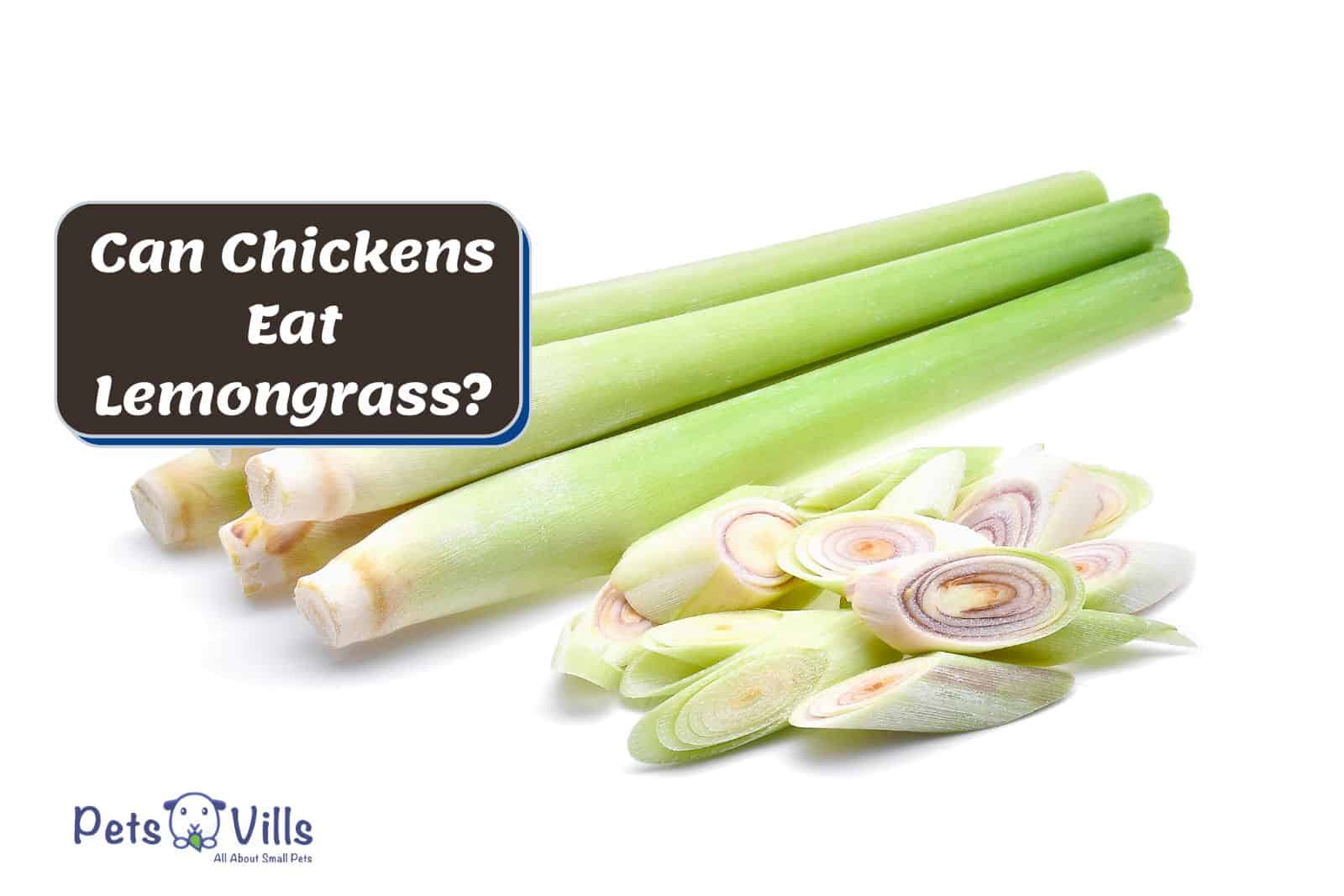Lemongrass has culinary, medicinal, and essential oil use, so I often wondered whether my chickens could eat it. Finally, I found an answer after significant research into the topic.
So can chickens eat lemongrass? According to experts, chickens can eat lemongrass in moderation. The stalks and leaves are safe for them since it does not contain any toxins (1).
However, it isn’t enough to know if lemongrass is safe for chickens.
But if you read on, I’ll walk you through everything about adding it to a chicken’s diet.
Table of Contents
Key Takeaways
- Lemongrass is perfectly safe and beneficial for chickens to eat in moderation. A small amount once or twice weekly should be enough.
- If used correctly, lemongrass offers several health benefits. Some include being nutritionally rich, containing various antioxidants, providing antimicrobial properties, and promoting a healthy digestive system.
- Owners can feed their chickens in three primary ways. You can chop off fresh lemongrass, mix it into chicken, or brew lemongrass tea.
Benefits of Lemongrass to Chickens
Since we’ve determined whether lemon grass is safe for chickens, it’s time to look at if it’s a good diet addition.
The first thing to acknowledge is lemongrass plants have many beneficial nutrients for chickens. Let’s take a look at its awesome health benefits for chickens:
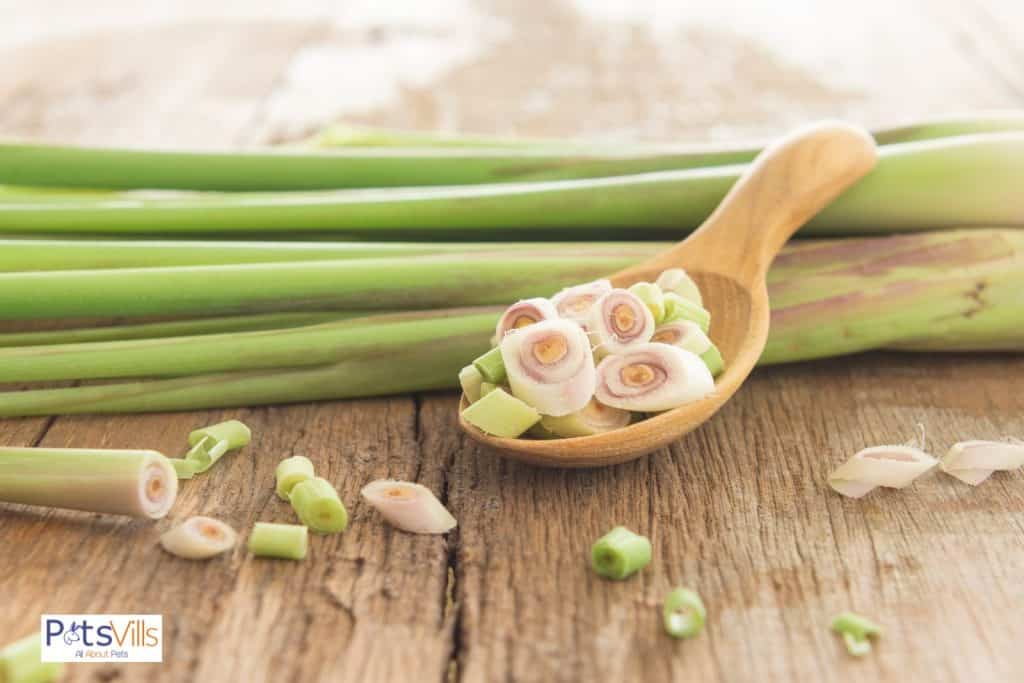
#1 Contains Antioxidant Properties
Antioxidants are a primary reason lemongrass can be a valuable tool in your chicken’s diet. It contains several, including chlorogenic acid, isoorientin, and swertiajaponin.
Chicken owners can expect these antioxidants to work together to scavenge free radicals in the body. As a result, lemongrass can help prevent diseases and other conditions (2).
It’s also worth mentioning that antioxidants can prevent cell damage from free radicals. So it’s hard to argue including lemongrass in a chicken’s diet would be a bad idea.
#2 Offers Antimicrobial Properties
My favorite benefit provided by lemongrass is its antimicrobial properties. Therefore, I can use it to help lemongrass’s medicinal properties treat infections and bacteria.
In fact, lemongrass essential oil “can be used as a substitute for antibiotics” (3). It also has silver ions that can prevent bacteria and fungi in vitro.
So lemongrass oil ends up being tremendous for keeping your chickens healthy. I’ve even used this natural antibiotic on a few occasions for this very purpose.
In this situation, my chickens found themselves with some cuts. So I gave them it to speed up their recovery.
#3 Helps Promote Healthy Digestion
Using lemongrass as tea will help promote a healthy digestive system. I also use it as an excellent remedy for chickens with digestive issues such as upset stomach and diarrhea.
Recently, one of my chickens caught a bug that made them have gastrointestinal distress. Giving them lemongrass cleared up those issues and abdominal pain in only a day or two.
One last thing to consider is the lemongrass leaves can protect the stomach lining. It’s another way this popular herb helps keep your chicken’s digestive system in top shape.
Have you ever wondered if your chickens can enjoy the same healthy greens and spices as you do? Check out our articles on ‘do chickens eat leeks‘, ‘can chickens eat ginger‘, and ‘can chickens eat romaine lettuce‘ to learn more about feeding your feathered friends a nutritious and varied diet!
Can Chickens Eat Lemongrass Leaves?
You can feed lemongrass leaves to the chickens. This part of the herb contains many nutrients, such as antioxidant properties and vitamins/minerals
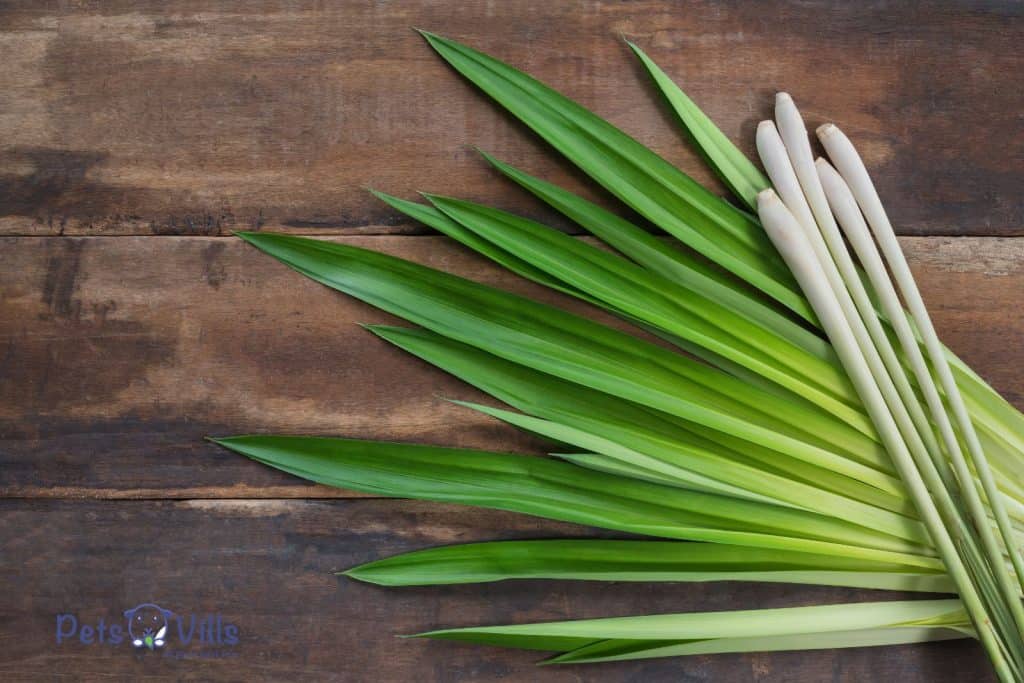
But I’d suggest cutting them into smaller sizes first. If you try to give them the entire leaves without cutting them, your chickens will ignore it.
I learned this lesson the hard way when first using lemongrass. My chickens responded to these large lemongrass leaves by pecking at them and then leaving them alone.
Furthermore, lemongrass has thin and tough leaves. Therefore, it makes cutting them even more vital when giving them to chickens.
So you’ll need to dice the fresh leaves up finely or cut them into small pieces before feeding them to the chickens. Otherwise, you’ll have a similar experience to mine.
Another option is to dry the lemongrass leaves. It’ll still have the nutrients of the fresh herbs, and you can store them longer.
Once the leaves are dried, crush them until it’s in bits and pieces. You can then sprinkle the dried lemongrass leaves on their feeds or treats..
How To Feed Lemongrass To Chickens
Every chicken owner knows that chickens will eat just about anything you feed them. This lack of pickiness comes from them not lacking taste buds as humans do.
As a result, so they’ll eat anything edible that can fit in their mouths. Lemongrass fits into this description when appropriately prepared.
But without any prep, the herb is too tough for the chickens to peck at and eat it. They’ll ignore if you toss the entire lemongrass stalk to them.
So the lemongrass will need to be fed to the chickens in a smaller size. Below are several methods you can try to feed lemongrass to the chickens:
#1 Fresh Lemongrass
I’ve found feeding chickens fresh lemongrass to be the best choice as it contains the most nutrition. Plus, it’s not the most complicated prep process in the world.
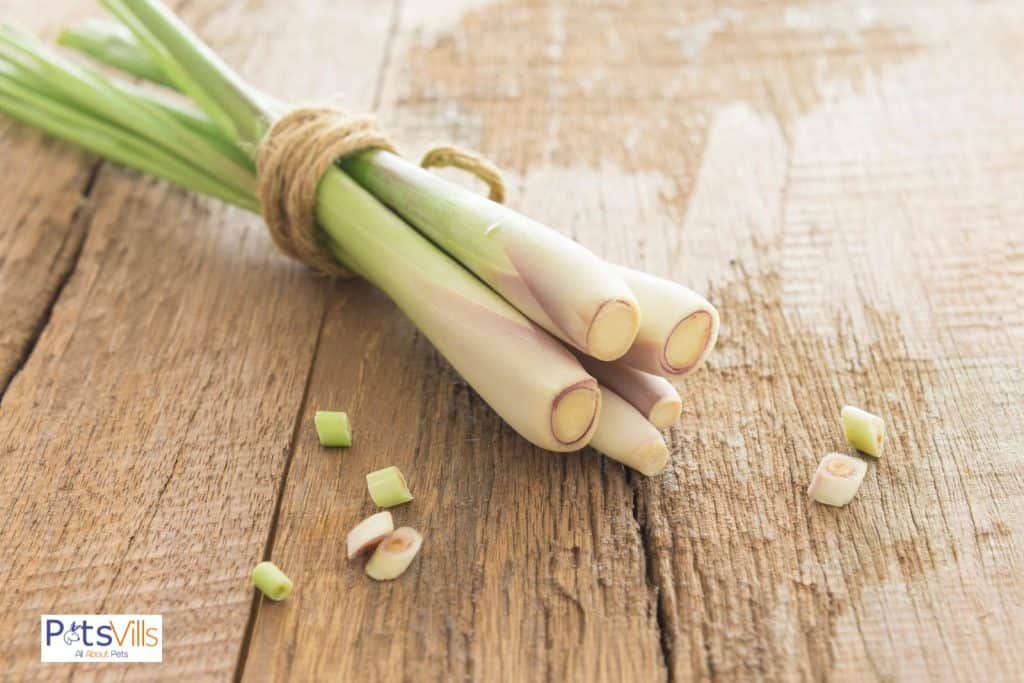
All you need to do is chop or dice the herb and toss it to the chickens. Alternatively, you can cut or slice the lemongrass into small thin pieces and feed them that way.
If you’re also feeding them lemongrass leaves, bunch the leaves together and dice them up finely. Then toss them to the chickens, and they will eat them.
#2 Mixing with Chicken Feeds
Mixing lemongrass with chicken feed is another worthwhile option. It’ll add a lot of nutrition to their meals.
Furthermore, some chickens won’t eat fresh lemongrass given to them. So mixing it with the feeds is an option.
You’ll start by cleaning the lemongrass well. It needs to be free of any potential pesticides or bacteria.
After cleaning, proceed to chop/dice the herb up finely. You can then place it in the feeds and mix it thoroughly. Finally, place the mix in their feeder and give it to the chickens.
#3 Lemongrass Tea
My last method involves extracting the nutrients from the lemongrass by boiling them in hot water. It’s an intriguing way of utilizing this herb to help with digestive issues.

You’ll want to start by cleaning the lemongrass. Once it’s clean, place them in a pot of water for about 20-30 minutes.
As the herb’s nutrients seep into the water, it will begin to turn light green. Then place the lemongrass tea into their bowl.
Your chickens should then drink the water normally. If they do, they’ll benefit in two ways: hydration and getting additional nutrients from the lemongrass.
How Much And How Often To Feed Lemongrass To Chickens
Even though lemongrass doesn’t have any toxins, you can’t feed them as much as you want. Generally, I recommend feeding this popular herb to the chickens in moderation.
Honestly, lemongrass and other herbs like lemon balm should make up only 10% of their diet. The rest should come from quality commercial feeds.
Most of the time, you can give them as many lemongrass herbs as you want at each feeding. After all, many chickens will not eat lots of herbs.
But some will keep eating these fresh herbs as long as you keep giving them. Therefore, once they eat all the lemongrass, avoid giving them more.
Lemongrass doesn’t have all the nutrition that the chickens require. Commercial feeds are formulated with the right amount of nutrition for them.
In other words, you’ll want to ensure they don’t overeat lemongrass and stop eating their staple food. So I’d suggest a small amount once or twice per week.
Other Herbs That Chickens Can Eat
Of course, lemongrass isn’t the only beneficial herb or usable herb for chickens. So I thought listing alternatives could offer more ideas to help spice up your chicken’s diet:
#1 Sage
Sage is the first option to pop into my mind when thinking of other chicken-safe herbs. It’s a practical choice for chickens due to its rich nutritional value.
It also doesn’t help that safe is easy to grow. I’ve found immense success growing it in my beautiful garden bed. Trust me; if I didn’t have any issues, you won’t either.
Lastly, chickens seem to have no problems eating sage. Mine devour it every time I place sage in their chicken coop.
#2 Cilantro
Cilantro is an antioxidant-rich herb known for its impressive medicinal properties. For instance, it can fight infections while promoting digestive, heart, brain, and skin health.
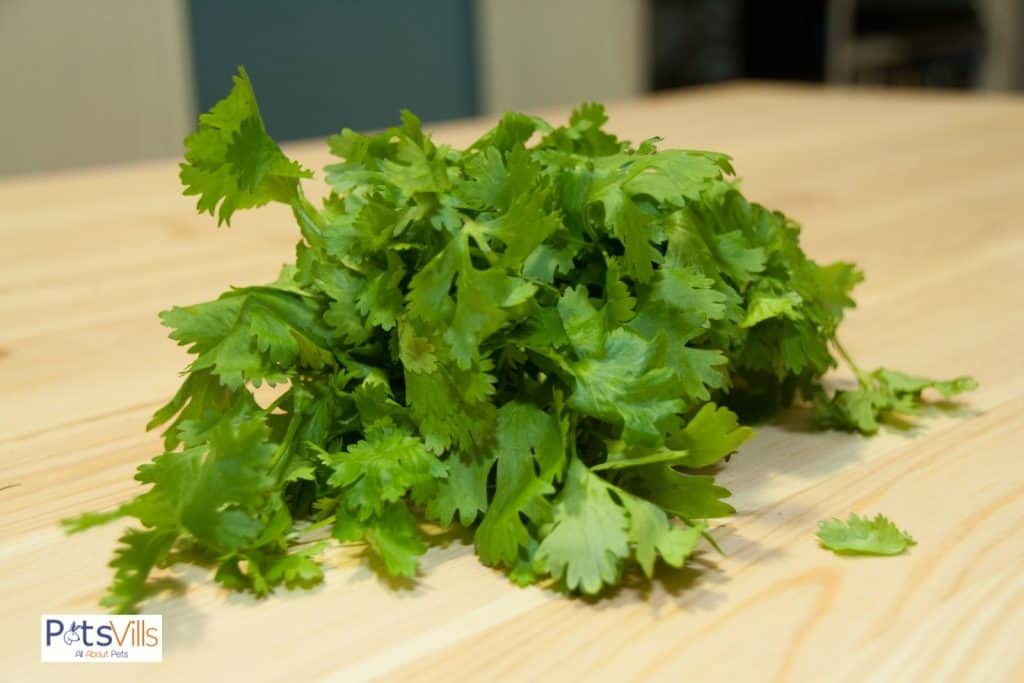
Given this information, it’s an excellent choice for chickens who need an extra nutrition boost when sick. I’ve gone to it more than once when my chickens get sick.
If you need a visual aid, check out these adorable chickens trying some cilantro.
#3 Parsley
Parsley is an herb rich in antioxidants and a great source of vitamin A, vitamin C, and vitamin K. It’s also a good source of calcium, iron, magnesium, and potassium.
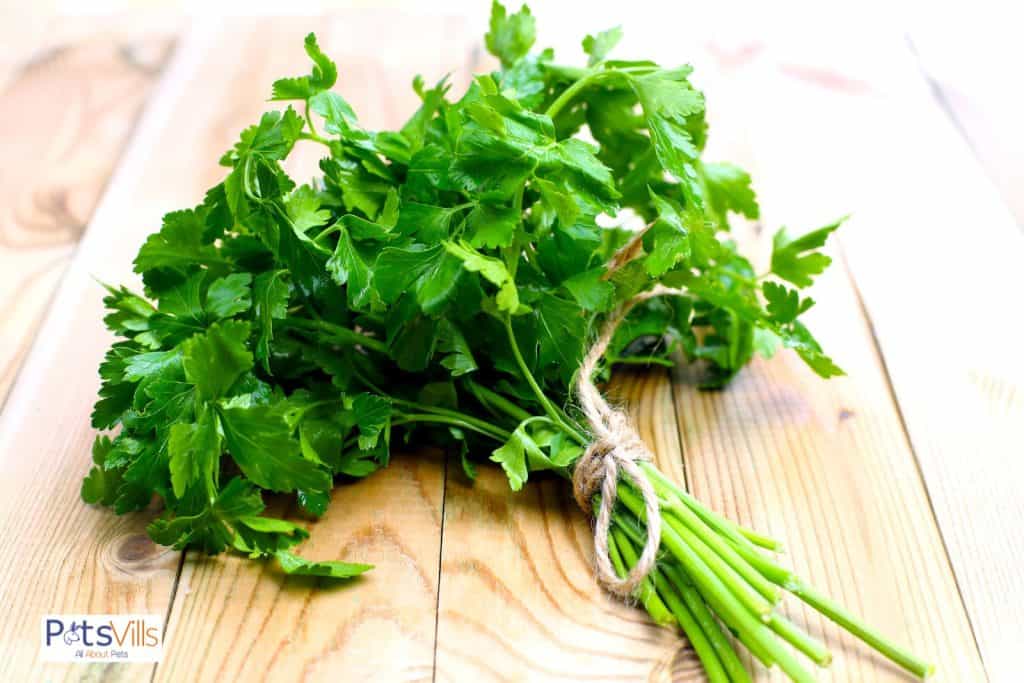
Therefore, it’s no wonder why humans consider it among the most vital culinary herbs. It’s made a massive difference in many of my meals.
But in any case, this high nutritional value also ensures the herb is an excellent treat for chickens. It’s pretty practical, too, because every part of the parsley is edible.
FAQs
#1 What Herbs Can Chickens Not Eat?
Chickens can’t eat aloe vera, comfrey, foxglove, henbane, and several other herbs. It’s why owners must research any herb before giving it to their chickens.
#2 Is Lawn Grass Good for Chickens?
Lawn grass is good for chickens under the right circumstances. In other words, it needs to be free of pesticides or insecticides before putting it in the chicken coop.
Conclusion
Can chickens eat lemongrass? Yes, it’s a nutritionally rich herb without any toxins that could cause them problems.
If you limit the amount, lemongrass should be an essential diet addition. It’ll then play an active role in keeping your chickens healthy and happy.
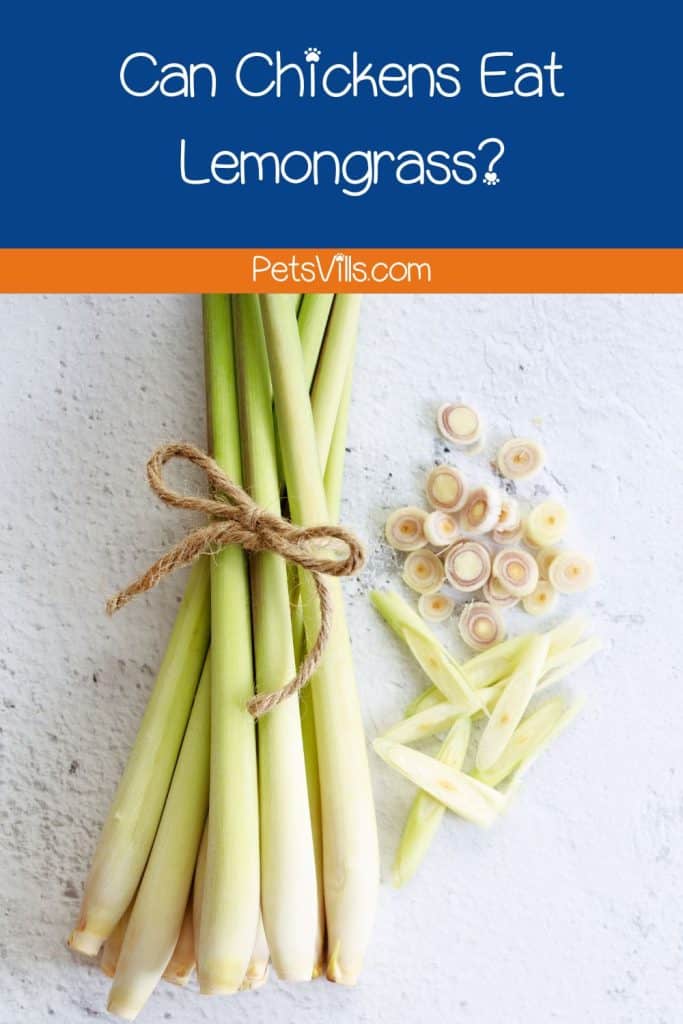
Resources
1. Available from: https://www.researchgate.net/publication/331310703_Performance-of-Lemongrass-in-chicken
2. Diseases of Poultry | Mississippi State University Extension Service [Internet]. extension.msstate.edu. Available from: http://extension.msstate.edu/agriculture/livestock/poultry/diseases-poultry
3. Alagawany M, El-Saadony MT, Elnesr SS, Farahat M, Attia G, Madkour M, et al. Use of lemongrass essential oil as a feed additive in quail’s nutrition: its effect on growth, carcass, blood biochemistry, antioxidant and immunological indices, digestive enzymes and intestinal microbiota. Poultry Science [Internet]. 2021;100:101172. Available from: https://www.sciencedirect.com/science/article/pii/S0032579121002066
Alina Hartley is a small-town girl with a ginormous love of bearded dragons. It all started with Winchester, a baby bearded who was abandoned at the shelter by his former owners because of a birth defect that caused one front leg to be shorter than the other. Alina originally went to the shelter looking for a guinea pig, but one look at Winchester and it was love at first sight. From that day on, Alina has dedicated her life to learning everything she can about bearded dragons. She loves helping new beardie parents start their incredible journey with these magnificent reptiles.
Follow her on:
LINKEDIN
TWITTER.
Read her latest articles HERE
Learn more about her HERE.

